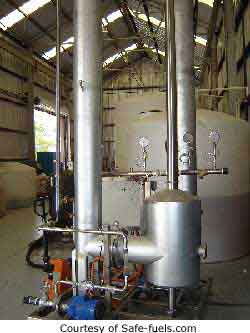|
Diesel engine fuel made from sources other than petroleum is known as biodiesel. Among the common sources are vegetable oils, rendered chicken fat, and used fry oil. In fact, Rudolf Diesel's demonstration engine ran on peanut oil at the 1900 Paris World Exposition. Processing these oils into fuel involves removing glycerin and other contaminants through a process called transesterification. In organic chemistry, transesterification is the process of exchanging the alkoxy group of an ester compound by another alcohol. These reactions are often catalyzed by the addition of an acid or base.Unlike spark-ignition engines, diesel engines rely solely on high compression in the cylinder to raise the temperature of the air fuel mixture enough to ignite. Consequently, diesels are tolerant of varying-quality fuels and the high compression results in high efficiency. Diesels extract more energy from each gallon than gasoline engines, and less energy is lost as heat than with a gasoline engine.
PROS: Modern diesel engines can run on 100 percent biodiesel with little degradation in performance compared to petrodiesel because the BTU content of both fuels is similar--120,000 to 130,000 BTU per gallon. In addition, biodiesel burns cleaner than petrodiesel, with reduced emissions. Unlike petrodiesel, biodiesel molecules are oxygen-bearing, and partially support their own combustion. Petrodiesel (commonly known as Diesel, or, less seriously, dinodiesel) is produced from petroleum, when there is a need to distinguish it from diesel obtained from other sources such as vegidiesel (biodiesel) derived from pure (SVO) or recycled waste (WVO) vegetable oil. According to the DOE, pure biodiesel reduces CO2 emissions by more than 75 percent over petroleum diesel. A blend of 20 percent biodiesel and 80 percent petrodiesel, sold as B20, reduces CO2 emissions by around 15 percent.

|
CONS: Pure biodiesel, B100, costs about $3.50, currently just under a dollar more per gallon than petrodiesel. In low temperatures, higher concentration biodiesel and blends B30, become waxy solids and do not flow. Special additives or fuel warmers are needed to prevent fuel waxing resulting in an even higher cost per gallon.
Outlook: Biodiesel has a viable future as a major fuel for transportation. According to the National Biodiesel Board, production of biodiesel in 2004 was about 25 million gallons, tripling to more than 75 million gallons in 2005. The trend is solidly upward, thanks to government incentives, the growing number of new diesel vehicles for sale and a grass-roots groundswell of support. The still rising price of petrodiesel could eventually outweigh the cost of biodiesel, making it the more affordable choice.
Like E85, biodiesel began with farm co-ops and local entrepreneurs. High fuel prices affect farmers and consumers alike, and here was an opportunity to make money from otherwise fallow farmland. Country singer Willie Nelson, in partnership with several Dallas businessmen, has lent his name to Bio-Willie, a brand of B20 marketed mainly to long-haul truck drivers in California, Texas, the South and the Midwest. Drivers praise the fuel for its low emissions, but obstacles to mainstream acceptance include a higher price than petrodiesel (seasonally and regionally, 10 to 25 cents a gallon) and the need to heat storage tanks in colder climates to prevent the fuel from gelling.
|







